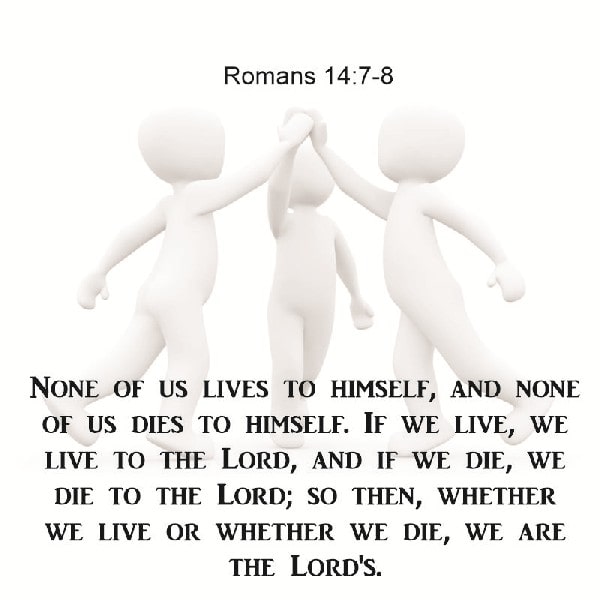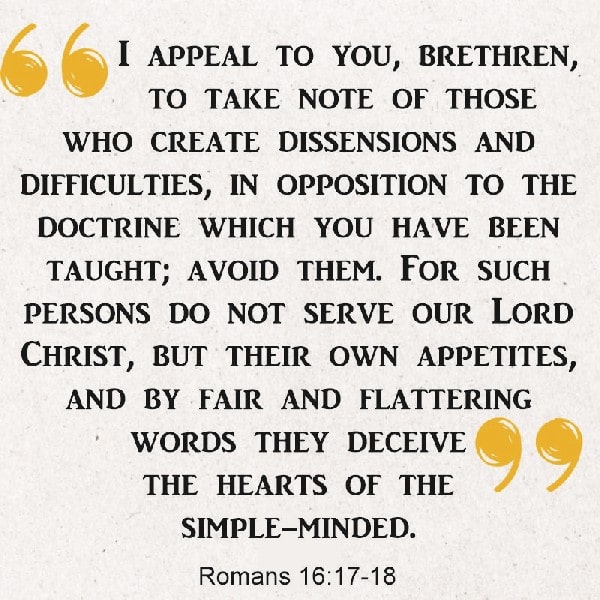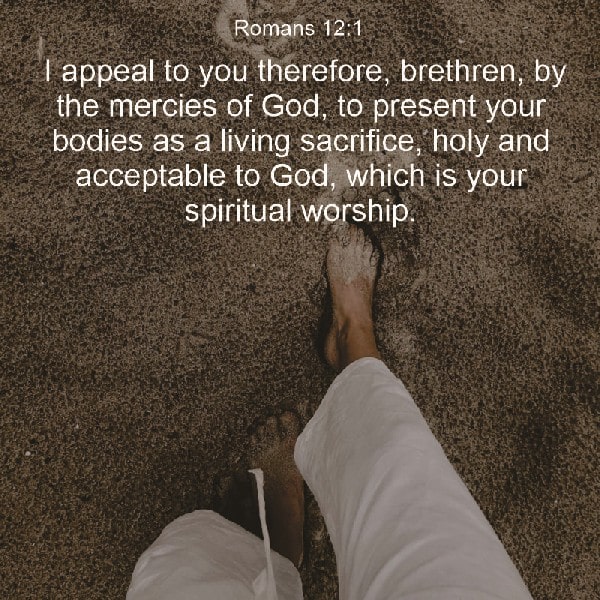Bible study Daily, explanation and encouragement - Romans
Faith is boldly choosing to believe what God has said.
21st century faith needs to relearn to fully believe the testimony of the scriptures!
Among the keys to faithful living is the truth of our conversion. Faith sets us free to live as we never have before for the good of others.
- Boldly proclaim the gospel.
- Unleash the creative power of God's Word by believing in it in the face of threatening circumstances. Rom 4:17-18.
- Resist when tempted by unbelief, knowing that God can do what He promises. Rom 4:20-25
- Understand that through baptism, you were crucified with Christ. Choose to believe that you too have joined Jesus in His death, burial, and resurrection. Rom 6:1-10
- Live in such a way as to strengthen weakness in faith. Commit to the development of others. Rom 15:1-3
Romans 1:16

Paul was not afraid that the gospel would not measure up to its encounter with the culture and vulgarity accumulated by the metropolis, nor that the powers (spiritual or not), the culture and banality dominant there, might diminish the gospel and even ridicule the apostle. But this intrepidity is not based on a confidence in your own spiritual resources, nor his eloquence, or anything of that kind. This confidence rests solely on the power of the Gospel.
Paul does not say that the gospel has this power, but that it is the power of God - the very power of God, unique, incomparable, omnipotent. When the gospel is proclaimed by the Holy Spirit, the power of God (dynamically) is at work. God is the source of salvation, but He saves through the gospel message (1 Cor. 1:18-21). And the implication is that the power of God is only operative for salvation through the gospel. It is the gospel which is the power of God unto salvation. The message is the Word of God, and the Word of God is living and powerful (Heb. 4:12).
The condition of sin is an existence under the wrath of God, which is manifested from heaven. Also the wrath of God means the condition of man when he turned away from the Creator. Luther noted that "In Christ", "God is love". Outside of Christ, "Our God is a consuming fire." God's wrath, then, is not an incidental truth. It is part of the divine self-revelation associated with the gospel. This wrath … (now) manifests itself, exactly as "the righteousness of God."
What is the wrath of God? In some passages the apostle Paul writes and warns that "whatever a man sows, this he will also reap" (Gal. 6:7), and that "the wages of sin is death" (Rom. 6:23). God created a moral order in which sin is its own punishment and destruction, and in this chapter divine wrath means that God gives up on men as a result of their rebellion and evil deeds (Rom. 1:24-32).
The term "without excuse" or inexcusable applies to men who know the righteousness of God, men who know God's verdict for sin and for the sins that are described in Romans chapter 1:29; a judge is inexcusable if he does wrong, because as a judge he knows the law - he, of all men, is the one who cannot plead ignorance. The perversity of man's heart is revealed in his tendency to condemn others for what he allows himself. Spiritual pride and lack of blame draw us from the Lord's love as surely as adultery or theft.
- We are given the power of moral judgment, not to feel like our fellows, but to judge ourselves and consequently be brought to repentance and return to God. The fact that the hour of divine judgment has not yet come for us in no way means that God judges us favorably. God, with His patience, grants us respite, so that the knowledge of good may give us conditions for repentance.
- But if, as verse 5 says, our heart becomes hard and unrepentant, even in the face of divine goodness, this removes it from the sphere of divine grace, as certainly as the sin of idolatry among the heathen. DESPISING THE RICHES OF DIVINE MERCY IS TO ACCUMULATE WILL GO UNTO THE DAY OF GOD'S WRATH AND MANIFESTATION OF JUDGMENT.
- Here Paul is saying that Jews and Gentiles are equal before God. The difference between Jews and Gentiles is more than a matter of race; it is a matter of revelation. God, through Moses, gave the law to Israel; this privilege the Gentiles never had. However, even without receiving this revelation from the Word, they are guilty of an act of responsible rebellion against the Creator, in view of His general revelation in nature.
- Bringing it to the present day, the world wants to silence the voice of Christians, in some places excerpts from the Bible cannot be mentioned, because it will hurt others. They do not allow the truth of the Gospel to be preached. There is already a pastor arrested for preaching the gospel. But with or without speaking the world will be judged by the laws of God. They can shut us up, arrest us or even kill us. But they will not escape the judgment of God.
- What we are told is that the great need today is to reconcile men with each other, and that doing this is the task of the church. The world is cut and divided over racial issues, skin color issues, political issues; it is a world marked by various kinds of curtains - iron, bamboo and others - and the great need, we are told, is to reconcile men with one another. That is where they start, and that is where they end. Sin is considered as a disease, as a disease from which we need to be healed. The world is medicating the symptoms and forgetting the disease. You are addressing the particular manifestations of the problem rather than the root of the problem.
- Jesus is the Savior! We are not to invite people to "come to Jesus" as a friend, or one who heals the body, or who gives some comfort, etc. NO! HE IS THE SAVIOR! He came to seek and save what was lost. But why do we need salvation? The answer is, because of "the wrath of God upon all ungodliness and righteousness of men", but this is a doctrine which modern man utterly annoys. It does not like discipline, it does not like the law, and that is why the world is the way it is. Man opposes the only thing that can make him live.
Give glory to God even before the blessing is manifested (Romans 4:19 to 21).
Do not be anxious about anything, but in everything, through prayer and supplication, and with thanksgiving (Philippians 4: 6), present your requests to God.
They are thoughts of faith and speaking words of faith that lead the heart out of defeat and into victory.
Act as if you have already received what you are asking for.
Fully convinced! Do not doubt the promise of God through unbelief, but be strengthened in faith, giving glory to God, "and being very sure that what God had promised was also mighty to do so" (Romans 4:21).
Abraham had every reason to discredit God's promise . . . "The father of the nations" with his sterile and aged wife, and he too was already old, how could that be? Every promise must pass the test of time for faith to move. Abraham did not conduct his own body. He did not meditate on all the logical reasons against it. He put his faith in motion, became fully convinced! CONSIDER YOUR GOD, consider the word of God, consider your faithfulness. Be convinced that He will do!
Romans 5:3-5

- HOPE DOES NOT DECEIVE US - that is, it is not illusory, or, it does not bring confusion. This is a quote from Isaiah 28:16. We are not disappointed - we are not afraid of being disappointed - "because the love of God has been poured out in our hearts through the Holy Spirit who was given to us". We hope to receive the glory of God, because we have already received the love of God. thus, more than hope, it is hope that is already beginning to be fulfilled. THE LOVE OF GOD is not our love for God, but God's love for us. It is the reality of God "poured out in our heart!" He shares with us something of his own nature.
- As we hope to feel the glory of God, let us also boast in tribulations. Far from being destroyed by these experiences, they should strengthen our hope.
Romans 5:6

God's love in our hearts:
- The gift distributed - the love of God.
- The recipient - poured into our heart (our true being).
- The agent - The Holy Spirit which He has given us (Luke 11:13; Acts 2:4).
While we were still helpless or weak - without strength for us to save - he died for our sins. Our natural condition is one of moral incapacity. We have no strength in ourselves to be justified. But through the Cross of Christ we receive the supernatural enablement to be converted. BUT GOD PROVES HIS LOVE TOWARDS US IN WHICH CHRIST DIED FOR US… BEING ENEMIES. If we want to know what the love (Agape) of God is, Paul answers by showing us the death of Christ. Nowhere else is there such a revelation of love as we find on the Cross. Only there do we discover the meaning of God's love. 1 John 3:16 - This is how we know love, that He laid down His life for us. Through the Cross, we have an opening to the heart of God and we see that it is a question of a love that is given and sacrificed.
LOVE IS UNCONDITIONAL!
Loving people unconditionally is a huge challenge.
We do our best to avoid every unpleasant person that God puts in our way.
Some people are put in our way with the sole purpose of being sandpaper for us.
Believe it or not, all the hateful people in our lives help us. They sand and refine us so that God can use us.
Think about it!
God loves you and wants to change you for the better, use this bad circumstance to train yourself for the better. Sometimes the miracle just depends on our reaction to the situations.
Romans 5:8

Paul contrasts divine love with human love. Human love is motivated by the nature of its object - under certain conditions it can lead us to die for a just man. Divine love is not motivated by the righteousness of its object, but is given to sinners, even to its enemies. Divine love wells up from the very being of God like an artesian well. The only explanation is that "God is love". It is the nature of agape love that it is poured out "upon the evil and the good" (see Matt. 5:43-48). It is this revelation of God as agape that constitutes the exclusivity and singularity of the Christian gospel. When asked if his religion taught that God loved him, a Hindu university student replied in the affirmative. To the next question, "When does he love you?" he replied "When I am good." The Christian message is that God loves us, even with our iniquities and hostilities: BUT GOD PROVES HIS LOVE FOR US IN WHICH CHRIST DIED FOR US, WHILE WE WERE STILL SINNERS. The manifestation of God's love takes place through a historical event: the cross.
Romans 5:15

- THE SIN - a little earlier, in verse 12 it says: When Adam sinned, sin entered the world and with it death, which extended to all, because all sinned.
- So far, Paul had dealt with sin as a problem of guilt. Now he presents the idea of sin as revolt. - To the principle of revolt by which the human will rises against the divine will. Here sin is not a mere act, but A LIVING, HOSTILE, DEADLY POWER. What Adam did was not something that concerned him alone as an individual, but by his act sin came to reign in the world, over the human race as a whole. Sin here is almost personified. He reigns as a cruel tyrant (5:21) and, taking advantage of God's commands, deceives and kills men (7:9). In chapter 7:20 he is "the sin that dwells in me". Here, in this chapter, Paul speaks of sin in its fullness - a principle of revolt that results in many offenses. This is the sin that entered the world in Eden.
Romans 5:17

- Continuing to talk about the power of sin in man's life. And death came because of sin. Paul says: so also death passed on to all men, because of which all have sinned. Due to Adam's disobedience, "the inheritance of sin and death passed to the whole human race, and no one was able to stop that inheritance because no one was free from sin." WHAT IS THE DEATH THAT IS SPREAD BY ALL MEN? It is the other side of sin. Where sin lives, death lives in sin - and we are not alive. Where sin reigns, it reigns in death - and we are dead. When sin commands, its currency of payment is death. Sin is a desolate, lifeless, disconnected existence. The apostle seldom refers to death as the moment when a man's heart ceases to beat, though that tangible moment is by no means excluded from the meaning. Sin and death are correlates. LIVING IN SIN IS LIVING IN DEATH, for the person is actually a slave of death and obeys his orders. But with equal force Paul can say that through sin death reigns, for the law of sin is intrinsically the law of death. DEATH IS PRESENT WHENEVER THE WILL OF THE FLESH AND NOT THE WILL OF THE SPIRIT DETERMINES ANYONE'S THOUGHTS AND DESIRES.
Romans 6:1-2

- In verse 1, Paul asks: What conclusion should we draw from my previous position? What shall we say then? Shall we continue in sin, that grace may abound? That is, will we have to be hospitable to sin, which has reigned since the fall of Adam? Shall we give this sin a home? Shall we, those who have been justified, continue in the same relationship they had with sin before we came to Christ? Must we continue to acknowledge sin for grace to abound?
- The answer is a resounding BY NO MEANS! WE WHO ARE DEAD TO SIN HOW SHALL WE STILL LIVE IN IT? We cannot, as Christians, continue to live in sin because as Christians we died to sin; as far as sin is concerned, we are dead. Dying points to a finished moment; conversion and (as the next verse shows) born again and baptism must be in mind.
Romans 6:12

- Although the dominion of sin is destroyed by justification, it is still possible that, although sin no longer needs to dominate, yet the justified man can escape grace and allow sin to dominate. It is possible that this man "continues to give up" his body parts as an instrument for the use of sin. "The very phrase 'let sin not rule' supposes that he is still there. But he must no longer stand as sovereign, for he has lost his instrument and mighty helper, the body, which has become, in Christ, the instrument God's". That is why the Christian, and only the Christian, can present his members to God as instruments of righteousness. He was released from the dominion of sin in his personality; he is a free man in Christ. The question he now faces is: WHAT AM I GOING TO DO WITH MY NEW FREEDOM? Will I use it "to give occasion to the flesh" or will I use it to serve God and my neighbor in love? (Gal 5:13). Will I place myself at the disposal of evil, or will I surrender myself to God in an act of complete consecration? It is important that we present our deepest heart to God, saying "YOUR WILL BE DONE AND NOT MINE". Make every organ of your body, and every power of your redeemed personality, available to God. This is man's part - the consecration. God's part is sanctification. This is made clear in verse 22: "But now you have been freed from sin and are God's servants. By doing so, you gain a life completely dedicated to Him, and the result is that you will have eternal life." OUR ROLE IS TO CONSECRATE; GOD'S BUSINESS IS TO SANCTIFY. OURS IS TO DELIVER; GOD'S BUSINESS IS TO TRANSFORM.
Romans 6:16

FOR SIN SHALL NOT HAVE DOMINION OVER YOU, FOR YOU ARE NOT UNDER LAW, BUT UNDER GRACE Rom 5:14
John Calvin writes: Here we have, it seems to me, an encouragement for the comfort of believers, lest they fail in their attempts to cling to holiness by realizing their own weakness. He exhorted them to exert all their strength in obeying justice, but since they still have the residue of the flesh, they cannot do anything but walk hesitantly. This is the dilemma of the justified man who has not yet felt the scope of divine sanctification, which is the adjective for his life. He finds himself, at times, crushed by sin; and so he needs to build again the foundations of repentance and faith. Let this man not lose heart, for there is now no condemnation for those who are in Christ Jesus (Rom 8:1). As a justified believer, seeking to walk in the full light of God, he is no longer under law but under grace. God does not count residual sin against the believer, as long as the believer, turning against sin with the deepest personal rejection, and turning to God with the deepest personal commitment, seeks the complete deliverance of the Spirit in his life. Let the believer, therefore, rejoice in the smile of God, and live in the happy expectation of complete deliverance by the power of Christ. Although sin remains, it does not dominate. Therefore, the believer can find courage and comfort in Christ. Since we too are under grace, we are not responsible for our inadvertent and unconscious transgressions against God's law. Christians have been led from the legal order of works to the evangelical order that works by love. But let the believer never forget the words of promise: "He who calls you is faithful, who will also do it" (1 Thess. 5:23, 24).
Romans 6:20

Man has a Lord, one way or another. Either he is a servant of sin, or a servant of obedience. Sin and obedience, therefore, are not our actions in the first place, but the powers that exercise dominion over us. By placing these two lords overlapping, Paul makes it clear that sin is disobedience, not mere misunderstanding of the meaning. The man who sins is not just a bad marksman, he lives in the wrong spot and thus misses the target. Sin is a willful error. Since sin is such a serious matter, the justified believer who willfully disobeys God again finds himself in bondage to sin. As the Lord Himself warned, "Truly, truly, I say to you, every one who commits sin is a slave to sin" (John 8:34). And
THE WAGES OF SIN IS DEATH (v.23).
Paul is echoing God's warning to Adam when he was innocent (Gen. 3:3), as well as the prophet's word, "The soul that sinneth, he shall die" (Ezek. 18:4). To disobey God is again to come under "the law of sin and death." On the other hand, slavery to obedience results in righteousness.
Romans 6:23

The wages of sin, the end to which sin leads, is the second death. In Revelation 20, the apostle John draws a distinction. Those whose names are written in the Lamb's book of life do not share in the second death; but everyone else participates. In other words, the wages of sin is the second death. It means a final and irreversible separation from God, "from the face of God" and from the life by God. It means to be eternally outside the life by God and all His beneficent, loving, noble, holy, and pure influences; it is for the sinner to be left in his impurity and wickedness, to wickedness, and thereby to be left in greater and greater anguish and without relief. It is to be left completely out and cut off from God, finally and definitely. It is to be cast into what the language at the end of the twentieth chapter of the Revelation describes as "a lake of fire and brimstone" into which death and Hades are cast, as well as the beast and the devil himself. It is to be eternally outside the life by God. This is the end to which sin leads its slaves.
Romans 8:1

Guilt is an invisible burden that wears us down and does us no good. It impedes progress and makes us unable to have proper fellowship with God because we must approach him in faith and trust, not fear and guilt.
Romans 8:1 instructs us to walk in the Spirit and not in the flesh. One of the ways to deal with our sins is to understand that once we repent God forgives us and we don't have to feel guilty. God promises that He is faithful to forgive our sins, if we confess our sins, and to cleanse us from them (1 John 1:9). God does not do things by halves. Does not believe your feelings any more than the Word of God.
Romans 8:6

In another translation this verse says: "A mind set on the flesh is death, but a mind set on the Spirit is life and peace." The Greek expression is to phronema tes sarkos, literally, "the thoughts or mind of the flesh." Wesley interprets the mind set on the flesh as having its affections set on things that please the corrupt nature: for example, visible and temporary things; things of the earth, pleasures (of the senses or imagination), praise or riches. The flesh is more than sensuality, it is more than sexual lust. The flesh is man living on the earthly and material level, divorced from any contact with the spiritual. This is clear in Jesus' statement to Nicodemus: "That which is born of the flesh is flesh... Marvel not that I said unto thee, Ye must be born again" (John 3:6-7; 1 Cor. 2:14). An existence like this is death. Verse 5 is literally: "The thought of the flesh - death". The death that encompasses all miseries arising from sin, here and hereafter.
Romans 8:9

THE MIND OF THE SPIRIT
When we read 1 Corinthians 2:9-16 we see that those things which are invisible to the eyes of the natural man, God has revealed to us by his Spirit, for we have received...the Spirit who is from God, that we might know what is freely given to us by God. If "the mind, or thoughts, of the flesh" is earthly, "the mind of the Spirit" focuses on "the things that are above, where Christ is seated at the right hand of God" (Col 3:1). A man's true life is in heavenly places in Christ (Eph. 1:3; 2:6). Later in this chapter, Paul speaks of the firstfruits of the Spirit, which means that the Spirit is a foretaste (or a blessing that is enjoyed in advance) of the glory that will be revealed to us at the coming of Christ Jesus.
Romans 8:11

Here arise both a future gift and a present grace. No doubt the reference is to the resurrection of the body, which will take place when Christ comes; on that day our mortal bodies will be made alive. But as believers we now have "the firstfruits of the Spirit." Christ's resurrection was the beginning of all the blessings we receive through him. Through the risen Lord we receive, even now, the revitalized power of the Holy Spirit. So Paul is thinking here of all those revitalizing forces that come into history with Christ's victory over death and that are mediated to us by the Spirit. Salvation, therefore, is more than a soul matter; salvation touches every man, soul and body, both here and hereafter. In this particular passage, the Spirit is seen as the life-giving breath of God, as his mighty power by which creation is renewed.
Romans 8:12-14

MORTIFYING THE WORKS OF THE BODY - This is not self-flagellation, but rather maintaining an attitude of obedience as we pursue the holy fellowship of the Spirit (2 Cor 13:14).
Paul wants his readers to understand that this mortification of our bodily impulses by the Holy Spirit does not lead to a fall into legalism. BECAUSE ALL WHO ARE LEADED BY THE SPIRIT OF GOD, THEY ARE CHILDREN OF GOD. Mortification is not the basis but the result of our relationship with God. The Spirit's presence in our hearts is the result of a change in our relationship with God, a change in which God has taken the initiative. He sent his Son that his rebellious children might become his children by adoption. Mortification thus shows us that God has re-established filial relations. It is born from the renewed presence of the Holy Spirit within our hearts. Consequently there is no place for anxious fear.
Romans 8:15

The apostle follows this thought more fully in Galatians 4:1-7. Under the law, the highest relationship one can have with God is one of bondage - that is, the scrupulous effort to please God, which is inevitably accompanied by the spirit of bondage... in fear. But under grace, our relationship is one of sonship - that is, a filial relationship of love, characterized by joyful and grateful obedience. "But when the time had fully come, God sent forth his Son, born of woman, born under the law, to redeem those who were under the law, so that we might receive adoption as sons. And because you are sons, God has sent the Spirit of his Son into our hearts, crying, “Abba! Father!” So through God you are no longer a slave but a son, and if a son then an heir." (Gal 4:4-7).
The Aramaic word ABA is an indication of Paul's thinking. It was the intimate familiar term for Father. In every language there is such a word; in Medieval Latin this word was PAPA, (in English "Daddy"). Although the Jews addressed God with the term Abbi, which denoted reverence, no Jew would think of saying aba. This was the word Jesus used when praying (Mark 14:36). THE SPIRIT OF ADOPTION that we receive when we are justified by faith is the answer to the disciples' request. The Spirit puts the filial spirit in our hearts and the expression ABA, FATHER on our lips. Jesus is the Son of God by nature (John 1:18); we are by adoption.
Romans 8:15b

The first privilege of an adopted child, therefore, is to call God Father. Through the indwelling presence of Christ and the work of his Spirit, our sonship becomes a blessed experience of fellowship with God. The second privilege of the adopted son is that he becomes an heir to his adoptive Father's wealth. AND IF CHILDREN, THEN HEIRS ALSO, HEIRS OF GOD AND FELLOW HEIRS WITH CHRIST; PROVIDED WE SUFFER WITH HIM IN ORDER THAT WE MAY ALSO BE GLORIFIED WITH HIM (verse 17).
We can say that the purpose of adoption is to make someone the beneficiary of goods that he would otherwise have been deprived of.
There is no sharing in Christ's glory unless there is sharing in His sufferings. Sufferings, and then glory, is the order indicated in the case of Christ (1 Peter 1:11); the same thing applies to those who are joint heirs with him. It is important to note that they suffer with Him, and this joint participation is emphasized in both the suffering and the glorification. The sufferings of the children of God are considered by Paul as the sufferings of Christ (2 Cor 1:5; Phil 3:10; Col 1:24; 2 Tim 2:11; 1 Peter 4:13 and Mark 10:39).
Romans 8:18

Here Paul turns to the hope we have in Christ. God gives the Spirit to the believer as a foretaste of the glory which is to be revealed in us when Christ comes to consummate salvation.
Afflictions, therefore, belong to the present age, until the Comings of the Lord. The glory belongs to the age to come. It is the one which does not compare to the other. Afflictions are a "mere nothing" when compared with the glory that is to be revealed in us. Let us stand firm with the Lord.
Romans 8:19

What extent of creation is awaiting the revelation of the children of God? We can exclude angels, as they are not subject to vanity and bondage to corruption. Satan and demons must be excluded, as they cannot be considered as waiting for THE MANIFESTATION OF THE CHILDREN OF GOD. The sons of God are not included, as they are expressly mentioned in this verse. The unbelievers are not included, as they have no such expectations. "The creation," therefore, means the natural order, cursed as it is, in consequence of Adam's sin (Genesis 3:17). Here mention is made of that unique divine event towards which all creation moves. "All creation is on tiptoe to see the wondrous sight of the children of God taking their place."
Romans 8:19-20

Paul makes this point because his main purpose in mentioning creation is to emphasize to Christians the certainty of future salvation. His concern is not with creation itself, but in mentioning the subject he feels that further explanation is in order. "For the creation was subjected to futility, not willingly but because of him who subjected it, in hope that the creature itself also will be set free from the bondage of corruption into the freedom of the glory of the children of God." Paul says here 3 things:
1- The created order "was made a victim of frustration"
2- This did not happen by its will;
3- It was subjected in hope.
This can only mean that creation has not been corrupted through any fault of its own; but it was involved in Adam's fatal error.
The world we know is not the best possible world. He shares the unhappiness and purposelessness of man's sinful existence. But as she was not enslaved by her own will, God reserves a hope for her. THE HOPE OF CREATION IS TO SHARE THE REDEMPTION OF HUMANITY. Just as on the day of resurrection God will give us a new body, He will also create a corresponding new cosmos.
Romans 8:26

Even though we are indwelt by the Holy Spirit, we are still assailed by weaknesses, which include the sufferings of the body that can lead to physical death, with all the anguish of the spirit implied. Just as creation is frustrated, or subject to vanity, our weaknesses also frustrate the Holy Spirit and cause him to groan with us. Our weaknesses surely must run the gamut of human frailties: the racial effects of sin on our bodies and minds, the scars of our past sinful lives, our prejudices that get in the way of God's purposes, our neuroses that bring on depression, emotional and make us, at times, "act out of our role", our idiosyncrasies of temperament, our human tiredness and bad temper, besides the millions of defects that our mortal flesh has inherited. Without considering the presence of God in our lives we are just flesh. Our sanctification is entirely God's work. Philippians 2:13: For God is at work in you, both to will and to work for his good pleasure.
Romans 8:27

In this verse the emphasis is on our weaknesses and the help that is given for their alleviation. The expression BECAUSE WE DO NOT KNOW WHAT WE SHOULD ASK FOR shows how helpless we are in our weaknesses and sets the basis for the special kind of help provided by the Holy Spirit. "Prayer embraces every aspect of our need, and our weakness is exemplified and exposed by the fact that we do not even know what to ask for satisfactorily and properly." We do not know how to pray as the demands of our situation require. It is in this situation of weakness that the Spirit comes to our aid. This is grace in the subjective sense - the gracious help of the Holy Spirit who intercedes for us with groanings that cannot be uttered.
We have reached the point in Paul's life where he goes to Jerusalem and is arrested and then taken to Caesarea and imprisoned there for two years.
After a very hectic week in Jerusalem, pressured by Christians and persecuted by Jews, Paul spent two quiet years in prison in Caesarea, followed by two years in prison in Rome.
Perhaps the Lord felt that his zealous apostle was exerting himself beyond the limits of his strength and needed a rest. Would (for example) Paul's remark to the high priest (23:3) reveal a man whose nerves were frayed by a busy schedule connected with spreading the Gospel, traveling and constantly caring for the churches he had founded? Nothing fairer than asking this question. For Paul, though full of the Spirit, was perfectly human.
One thing we must bear in mind: out of these four years of enforced physical inactivity, and consequent opportunity for quiet meditation, emerged Paul's richest writings. If he had not been imprisoned - by the Spirit as well as by the Roman government - we would not have his prison epistles today, with their deep thoughts and spiritual truths. It was because of this experience that Paul could write, "I am a prisoner of Christ" (Eph. 3:1), not just a prisoner of Rome. As a prisoner of Jesus Christ, he was held under the control of the Holy Spirit, in a closer relationship with his Lord than ever before. Thus he was able to perform his most perfect service.
Romans 8:28

We have reached the point in Paul's life where he goes to Jerusalem and is arrested and then taken to Caesarea and imprisoned there for two years.
After a very hectic week in Jerusalem, pressured by Christians and persecuted by Jews, Paul spent two quiet years in prison in Caesarea, followed by two years in prison in Rome.
Perhaps the Lord felt that his zealous apostle was exerting himself beyond the limits of his strength and needed a rest. Would (for example) Paul's remark to the high priest (23:3) reveal a man whose nerves were frayed by a busy schedule connected with spreading the Gospel, traveling and constantly caring for the churches he had founded? Nothing fairer than asking this question. For Paul, though full of the Spirit, was perfectly human.
One thing we must bear in mind: out of these four years of enforced physical inactivity, and consequent opportunity for quiet meditation, emerged Paul's richest writings. If he had not been imprisoned - by the Spirit as well as by the Roman government - we would not have his prison epistles today, with their deep thoughts and spiritual truths. It was because of this experience that Paul could write, "I am a prisoner of Christ" (Eph. 3:1), not just a prisoner of Rome. As a prisoner of Jesus Christ, he was held under the control of the Holy Spirit, in a closer relationship with his Lord than ever before. Thus he was able to perform his most perfect service.
Romans 8:28

- All things is literally EVERYTHING, not simply all things of the spiritual order. Paul is literally including "everything". God causes those things which independently or of themselves prove to be our wrongs, to work out our ultimate good. This we know if we have the Spirit.
- This knowledge is the property, first and foremost, of those who love God. But as Jesus' quotation from Deuteronomy 6:4-5 indicates, love for God is more than an emotional response - it is the complete devotion of a person's personality to God. It is the devotion of Job, whose love was not due to selfish reasons (Job 1:9-12; 2:4-10). It is devotion that says, "EVEN IF HE KILL ME, I WILL HOPE IN HIM" (Job 13:15). Those who love God are those who live in "the spirit of obedience."
- Of those who are called by his decree - The reason for this is not found in us, but in God's eternal goal. Those who love God did not bring it of their own accord, but it was given to them by the call that was made by God, which is based on his eternal goal.
Romans 8:29-30

Predestination takes place in due time: And whom he predestined, them he also called - that is, in conversion, he simply becomes a Christian. CALLED implies a summons or an invitation that has been obeyed. This call is made by the Word of God and the Spirit; and whom He called, them He also justified, "because they answered His call in faith." With justification, Paul arrived at the present; but he is so sure of God's object that he can go on to describe the future with the past tense: AND WHOM HE JUSTIFIED, THEM HE ALSO GLORIFIED. But Paul does not assert, either here or elsewhere in his writings, that exactly the same number of men who are called, will be justified and glorified. He does not deny that a believer can fall and be destitute between his special calling and his glorification. Neither does he deny that many are called and never will be justified. He only asserts that this is the method by which God takes us step by step towards Heaven.
Romans 8:31

In God's choice and call there is an immense guarantee for the Christian in a world where there is so much against him. IF GOD IS FOR US, WHO IS AGAINST US? It is the salvation against which all who oppose us cannot prevail. There can be no doubt as to God's good will toward us: "But God demonstrates his love toward us in that while we were still sinners, Christ died for us" (5:8). THIS BEATS EVERYTHING ELSE. He who did not spare his own Son, but gave him up for us all, how will He not with him also give us all things? He who bestowed us "his unspeakable gift" will certainly not deny us the smallest tokens of his love.
GOD IS FOR US. If this is to be an inner certainty for us, the charge against us must be removed, and we must be transformed at the very core of our being. Thank God, the charge was swallowed up in the reconciling death of his own Son. By the blood of the Crucified I am justified.
Romans 8:35-36

But can we believe in God's love, even in the face of everything we need to go through again and again? For things do not always turn out the way some people interpret (8:28) that Christians live much better than others. Paul did not believe this. For him, and for many thousands of faithful witnesses to Christ, the Christian life meant tribulation... anguish... persecution... famine... nakedness... danger... sword. As it is written: For your sake we are killed all day long: we are accounted as sheep for the slaughter (35-36). The disciple is not above his Master. If they crucified Him, if His life was a life of suffering, should that be what was best for His disciples? If God, through His suffering, was able to give proof of divine love, then the sufferings of Christians should not obscure that love.
There are no obstacles to Christ's love for us. The basis of the believer's confidence is that the love of Christ suffers no loss for anything.
Romans 8:37

There is one other thing that we cannot be deprived of, and that is our union with Jesus Christ and a new daily experience in the midst of problems and suffering.
The gospel is a message of triumph...life in the Holy Spirit is no longer than the pitiful swinging back and forth between victory and defeat which characterizes man's condition under the Law; it is a victorious life. Paul here uses a strong and untranslatable expression. We are "excessively victorious". The joy of victory is the sign of life in the Spirit, just as the sinful nature is the mark of legalism. It is true that even he who truly belongs to Christ will never leave groanings behind as long as he lives on earth; but he will be able to leave the lamentations and anxiety. The note of victory is the visible mark of those who are united with the victor.
Romans 8:38-39

Everything else depends on the inner certainty - I AM SURE. The inward witness of the Spirit (15-16), bolstered by the power of new life in Christ, is the assurance that produces this profound assurance.
This guarantee is not automatic: it must clear the way through opposing forces - both natural and supernatural. Demonic powers continually throw doubt against this certainty, as if it were an indefensible pursuit. But no matter what adversaries attack us or our faith; one thing they cannot do: separate us from the love of Christ, obscure or discredit the love of God that we know in Christ. What Paul has taught us so far in these eight chapters is not a pretty theory, but an experience put to the test in the fierce ordeal of suffering and struggle. IN JESUS CHRIST OUR LORD "God is for us" in Him we are more than conquerors in the triumph of the certainty of faith. Our final glorification is conditional upon our suffering with Him, and our steadfastness in God's goodness. We are confident that He Who began a good work in you will bring it to completion at the day of Jesus Christ (Phil 1:6).
Romans 9:16

God, not man, defines the terms on which He will receive us into His grace. What right has he who wants to think he can bring God to his own terms? Either we follow God's terms, or we will not find mercy. But this is not an act of divine arbitrariness; our redemption in Christ is the outpouring of His mercy. It is because God is merciful that we can be justified by faith; and God is determined to deal with us on the ground of mercy. In fact, if He treated us differently, who would survive?
Romans 9:20

God does not respond to man. For the creature to judge the Creator is sinful pride, an attempt to bridge the eternal gulf that separates God from all created existence. Imagine people these days suggesting that the Bible be changed, updated, that it remove texts that contain "violence" or "hate speech"? Because texts are not read in context? But God deserves to be trusted, as acting consistently with His character, which was supremely revealed in Christ. With such a God to trust, why would any of his people question His methods? Paul insists that, just as a potter can mold his clay into the shape of the vessel he chooses, so God has all freedom to do what He wants with the humanity He created for His glory, and man has no more right to retort, than has the potter's clay. But the problem is that man is not a vessel; he will ask: "Why did you make me like this?" and he will not be silenced. Naturally man is not a vessel and stubborn questions arise in his mind. It is because the human mind asks so many questions about divine law relating to the universe that works such as the Epistle to the Romans are written. Everything depends, not on a man carrying out his will... but on the merciful God.
Romans 9:22

From this verse we understand that sometimes "the molded disappoints the potter's expectations". Israel is an example of this fact. The molded in the potter's hand may break and the work not be completed. Thus, the great lesson we learn is that He can save some and condemn others, but He only condemns those who reject salvation. The text says that God endured with much patience the vessels of wrath, prepared for destruction. It is understood that the vessels of wrath are made by the same potter who makes the vessels of righteousness. It is necessary to understand that God did not create anything and anyone for evil and destruction, but for the glory of God. To the "vessels" of wrath, before they are of "wrath", they are offered salvation. Once they have become vessels of wrath, there is no doubt that it is up to the potter to destroy or condemn them.
It could be said that God's patience with the rebellious has a twofold purpose. First, His patience can represent an opportunity for salvation. Instead of destroying the guilty, He can lead them to repentance and salvation. There is always an opportunity for the "rebellious mass" to exploit.
Romans 9:30-32

Just as tax collectors and prostitutes entered the kingdom of God in the days of Jesus' earthly ministry, so also believing Gentiles, who had never shown an interest in being righteous before God, were now being forgiven and received into God's grace. But the nation of Israel, which constantly struggled to be just, was being judged as unjust. Why? Because Israel thought that righteousness could be obtained "by works." The righteousness which God demands and bestows is by faith. The "righteous demand of the law" cannot be satisfied by those who follow the path of legal righteousness, but only by those who "walk not after the flesh, but after the Spirit."
Romans 10:9

FOR IT IS BY BELIEVING IN YOUR HEART THAT YOU ARE DECLAREED RIGHTEOUSNESS, AND IT IS BY DECLARE WITH YOUR MOUTH THAT YOU ARE SAVED. This passage means that, through incarnation and resurrection, Christ is close to us and right beside us.
1- The word is IN HIS MOUTH, and
2- IN YOUR HEART.
Righteousness by faith excludes all human effort. The path of faith in Christ becomes fully accessible, since it is impossible to get to Heaven or eternal life through legalism.
BELIEVE AND CONFESS - The issue of faith is highlighted, for the righteousness of Christ (not that of the Law) is only possible and achievable through faith.
Romans 10:13

All men have sinned, and apart from Christ all are lost. AND IT SHALL COME TO PASS, THAT ALL WHO CALL ON THE NAME OF THE LORD WILL BE SAVED (Joel 2:32). This quote strengthens Paul's argument that the Gospel is for all and with equal rights as far as salvation is concerned. Both Jews and Gentiles are entitled to salvation, but only the chosen one who accepts God's plan is saved. Thus, the election or rejection on the part of God will depend on the man himself. He will not reject simply because He can use His sovereignty to do so, once someone invokes His name.
Romans 10:14-15

God's promise is, "Everyone who calls on the name of the Lord will be saved" (vs 13). The problem is: Israel had not invoked that precious name. Where was the error? In verses 14 and 15, Paul answers this question by building a chain of connected links and asking which one was broken. How then shall they call on Him in whom they have not believed? And how will they believe in the one of whom they never heard? And how will they hear if there is no one to preach? And how will they preach if they are not sent? The links in this chain are self-evident. Men must call on the name of the Lord to be saved; but they will not call on that name unless they have been moved to believe in it; they cannot believe Him unless they have heard of Him; they cannot hear of Him unless someone proclaims the gospel to them; and no one can proclaim the gospel to them unless he has been sent. Thus, the preacher can be considered an "evangellist" in the most basic sense of the word.
The argument string is complete. Paul now shows that God did not fail to send preachers, and adds, a few verses later, that Israel did not fail to hear (18-19). The chain is broken at the point of faith. In this sense, faith is a gift from God: its basis is the "word of Christ". But God does not believe for us; if so, the nation of Israel would not be guilty. BELIEVING IS OUR DUTY.
Romans 10:16-17

- NOT EVERYONE OBEYS THE GOSPEL. This indicates that acceptance and rejection before God depends on man's acceptance or rejection, no matter whether Jew or Gentile. By quoting the prophet Isaiah, Paul emphasizes the fact that Israel itself is responsible for its rejection and indifference to the preaching of the Gospel. Paul points out that there is no excuse, for Israel's rejection as a people is due to their stubborn unbelief.
- The good news is announced, but "not all obey" or accept this gospel. Therefore, the Gospel of the Son of God makes both Jew and Greek inexcusable to all who reject it.
- LUCKY THAT FAITH COMES BY HEARING, AND HEARING BY THE WORD OF GOD. Here is the new method of salvation - faith. The gospel is not a matter of intuition, or imagination, or conjecture, or raving, but of revelation. Faith consists in the humble, grateful acceptance of that message.
THE SOUND OF ABUNDANCE!
Faith begins when we hear a sound that other people cannot hear.
Jesus continually used the expression ALL THAT.
If any man has ears to hear, let him hear. And he said to them, "Take heed what you hear; the measure you give will be the measure you get, and still more will be given you (Mark 4:23,25).
What we hear has a lot to do with what we have.
Jesus suggested that there are two groups of people; those who hear and those who do not.
FAITH COMES BY HEARING A CERTAIN SOUND. FAITH COMES BY HEARING THE WORD OF GOD.
The Word of God opens our ears to God's supernatural plan and provision!
Everything will be fine for those who believe!
Romans 10:17

- The Word of God illuminated by the Holy Spirit is the only true way to transform the human heart.
- Salvation by faith is a specific occasion, while the renewing of the mind by the Word is an ongoing process.
- The disciple devotes himself to the Word of God to be transformed into a holy person, enlightened like Christ and radically different from the world.
- Spiritual disciples devour the Word of God, because in it lies the key to a dynamic relationship with the Lord and greater availability for the Holy Spirit.
- Be constant in your reading and study of God's Word (Rom 10:17).
- Recognize that your faith will only grow as you feed on the Word of God.
- Allow the Word of God and the Holy Spirit to radically transform your thinking.
I beseech you, brothers, by the compassion of God, THAT YOU PRESENT YOUR BODIES IN A LIVING, HOLY AND PLEASANT SACRIFICE TO GOD, which is your rational worship. And do not be conformed to the renewal of your understanding, that what may be the good, pleasing, and perfect will of God Romans 12:1,2.
- God granted Paul a glimpse of His eternal purpose, and the apostle was amazed. God's thoughts are not our thoughts, neither are His ways ours (Isaiah 55:8-9).
- What Paul adores is the inscrutable wealth of love that allows God to more than meet the world's dire needs. A less profound love would run out early on in the task. In Sophia and in Gnosis, intellectual resources are brought into perspective with which God ordered, disposed and controlled all the forces of the world and of human history, to make them subservient to his love. The world, with its conflict of races, religions, passions and even bad habits, can appear to be a field of chaos. But when we see it in God's light, as Paul did, we can see the signs of wisdom and knowledge, from a conscious purpose that transcends human thought and calls for praise and worship.
- God's good and perfect will is outlined in 11:33 - 12:2
- In creation, 11:36:2
- At conversion, 12:1, compassion
- At the consecration, 12:1, present your bodies
- In purification, 12:2, be transformed by renewal
- In commitment, 12.2, so that you experience it.
- The body is under study here as the instrument through which all human worship is conveyed to God, and the worship which it translates, is supposedly not a cult of the body but a spiritual one. In Biblical psychology, body and spirit are one. This complete person must become a living sacrifice to God. This sacrifice is living as opposed to Old Testament sacrifices where the sacrifice was made up of dead animals. This means more than surrender or surrender: WE MUST BE CONSUMED … upon the SACRED ALTAR OF GOD'S WORSHIP.
- The sacrifice must be holy. The Christian must admit that his body belongs to God and that it must be set apart for His use.
- Chrysostom asks:
How can the body become a sacrifice? Let the eye see nothing evil, and it becomes a sacrifice; let the tongue say nothing shameful, and it becomes an offering; let the hand do nothing unlawful, and it becomes a burnt offering. No, this will not be enough, but we need to have the active practice of good - the hand needs to give alms, the mouth needs to bless instead of cursing, the ear needs to give constant attention to divine teachings. For there is nothing unclean about a sacrifice, a sacrifice is the firstfruits of other things. Therefore, may we produce fruit for God with our hands, with our feet, with our mouth, and with all our other members.
- To be sacrificed in the body and consecrated to the service of God implies that we: 1- Do not conform to this century (aeon), but 2- become members befitting the century to come.
- This season, in position to the future season (Ef 1:21) is 'evil' (Gl 1:4). Satan is the 'god' of this age (2 Cor 4:4). All of us, in our unregenerate condition, 'WALKED ACCORDING TO THE COURSE OF THIS WORLD...IN THE DESIRES OF OUR FLESH' (Eph. 2:2-3). But as men of faith we were raised with Christ and transferred into his heavenly kingdom (Eph. 2: 4-10) Col. 1: 13). When Christ rose from the dead "THE VIRTUES OF THE AGE TO COME" (Heb 6:5) came into operation in history. Those who died with Christ and rose with Him to NEW LIFE became members of the age to come. "In Christ they have entered the new age: they have received the firstfruits of the Spirit" (8:23) and are no longer under the obligations of the flesh, but of the Spirit (8:12).
- Here the obligations of this new life in Christ are expressed in a new way. Christians must not conform to this age, but be transformed by the constant renewal of understanding. They have a current model that must be rejected, it is a new standard to be understood and executed. The model to be rejected is the prevailing custom in the world. The consecrated believer must not only reject the custom of the world, he must be METAMORPHOSISED. The word MORPHE, 'form', indicates not an external posture fit for imitation, but an organic form, the natural product of a life principle which thus manifests itself.
- This admonition is a call to humility, which is a state of mind, and every believer should do the work he is entrusted with in humility and moderation. In performing God's service, let us do it, not by our own wisdom, but according to the measure of faith that is given by God.
- Men's opinions of themselves must be in proportion not to natural capabilities, but to God's gifts; if this happens, they will never be proud (even if God calls them to be evangelists), because they will remember that they have nothing that they have not received (1 Cor. 4:7). This recognition cuts the taproot of pride. It enables human beings to 'have a healthy view' of themselves.
Romans 12:4-5

For Paul, the church is the body of Christ. In Christ we are a corporate community. Believers have varied functions which are nevertheless essential to the proper functioning of the body they form; therefore, there is no place for anyone to think too great things about himself/herself. The full meaning of this thought of Paul becomes clear if we read 1 Corinthians 12 as a commentary on this matter. Any gift one has received conditions that individual for a particular line of service, which he/she must dedicate himself to.
Love is no fake (without hypocrisy, genuine, with all sincerity).
For Paul, as well as for John (1 John 4:7-10), Agape is the essential nature of God, His redeeming goodness expressed concretely in the cross (5:8). It is poured into our hearts by the Holy Spirit and thus is the supreme and all-encompassing gift of the Spirit (1 Cor 12:31 - 13:13). It is not by chance that here, as elsewhere in Paul's text, it is mentioned first among the virtues of the Christian life. If the love is sincere, all that Paul urges the church to do will follow.
However, Agape is not vapid sentimentality; it is a vigorous moral quality. When it is genuine, IT HATES EVIL AND HANGS ON TO GOOD. Of Christ, who was the incarnation of God's love, it is written, "You loved righteousness and hated iniquity" (Heb. 1:9). There is always something inexorable about divine love; it never closes his eyes to evil. Agape is holy Godly love.
This teaching is in line with Jesus' teachings in the Sermon on the Mount: BLESS THOSE WHO PERSECUTE YOU; BLESS AND DO NOT CURSE (Mt 5:44 - Lk 6:28). It is this ability of Agape to bless those who persecute you that rises above every human being. "IF YOU LOVE THOSE WHO LOVE YOU, WHAT REWARD WILL YOU HAVE?" (Mt 5:46-47). Human love is conditioned by goodness or being loved by those we love; Agape is unconditional in this sense - it gives itself willingly for its enemies. In Christian experience, this love is essentially God's own agape poured into our hearts by the Holy Spirit. It was this love, shown by the martyr Stephen, that deeply marked Paul's conscience and helped to prepare the way for his conversion.
The question that occurs at this point and that has been discussed very often is this: WHICH IS MORE DIFFICULT, TO REJOICE WITH THOSE WHO REJOICE OR TO WEEP WITH THOSE WHO MOUR? On the surface, the former is easier, but on closer examination, is rejoicing with those who rejoice more difficult of the two? But why?
- Crying with those who cry is more or less natural. By nature, human beings feel some empathic reaction when someone cries. Yes, there are people who are so hardened that not even crying, can move them.
- When someone cries it is because they are suffering, they are being humiliated or in difficulties. One thing or another keeps this person in a defeated state. That is what makes it easier for us to cry.
- For us, it is much easier to sympathize with those who are underneath. But why is it like this? Because the biggest problem of ALL human beings is the EGO problem, the pride problem. The ego is always looking at itself. He wants to be considered big and important. And this is innate in human nature, since the FALL.
- Well, when someone rejoices they have a reason. Had some success or was successful. Something good, something uplifting has happened to him, and he feels firmly on his feet - and he is filled with joy. And we are correspondingly JEALOUS. Surely it is not so natural for us to rejoice with those who rejoice. But here the apostle teaches us that we should take positive pleasure in our brother's joy in the faith, we should be involved in his joy. This is pleasing to God.
Romans 12:16

- The literal translation would be: THIRST OF THE SAME MIND TOWARDS ANOTHER. What does that mean? It means thinking the same things, agreeing with each other, being united in feeling, interests and goals of your interests. Or THERE IS NO DISCORD BETWEEN EACH OTHER. In another translation it says: "HAVE EQUAL CONSIDERATION FOR ONE ANOTHER". This is the apostle's particular injunction. We must all be envisioning - thinking - the same things. Our minds must be operating in the same way so that there is no division, no schism, but unity as a Christian people.
- And how can we accomplish this? Paulo continues to speak and explains to us how it can be done. The first thing is: DO NOT AMBITION HIGH THINGS. This phrase refers to our thinking of pride and intellectual haughtiness and more to high desires, ambition, socially speaking or in any other sphere. Pride is a devastating force in ordinary life, and the church has been a curse throughout its history.
- BE FRIENDS WITH PEOPLE OF HUMBLE STATUS - Not just with people, but in humble things. You must seek to understand Biblical teachings, yes, but the moment you become proud of your understanding, it will no longer be of any use to you. The inevitable effect of becoming proud of your knowledge is to look down on people who are not at your level of knowledge. Therefore, the apostle Paul says here: "Be carried away by people and things that are humble". There is a way of relating to humble people by patronizing them, and that attitude is vile and downright evil. When we relate to people what is important to know? Is he in good financial condition? No! What we need to know is: is this person a Christian? Is this person rich in faith? Is he a child of God? If yes, you belong to such people and you like to talk with them. There is nothing more incongruous than class distinctions in the church.
Romans 12:17-18

- NOBODY - means "nobody, whether Christian or not". Nothing can ever justify revenge in a Christian heart (Mt 5:38-48). The Christian should be an example of nobility of spirit. SEEK THINGS HONEST BEFORE ALL MEN - A Christian cannot bow down to meanness of spirit; even the heathen conscience condemns ignoble conduct.
- The Christian must be the person of peace, always fighting for peaceful relations with his fellow people in the world. This is one of the basic social obligations of Agape love. The man in Christ must go as far as is necessary to maintain a harmonious relationship with all men. If antagonism arises, as it almost inevitably will, the provocation must not come from the Christian side. When conflict comes, he should maintain a forgiving spirit, leaving the matter of his vengeance to God.
Romans 12:19, 21

- The apostle does not mean that we are to be comforted by our goodness with the knowledge that our enemy will be punished. This would represent a malicious motive. This attitude would be completely contrary to true love and would be contrary to the context of both the proverb passage and the passage we are analyzing. Paul's intention is clarified with the next exhortation: DO NOT BE OVERCOME BY EVIL, BUT OVERCOME EVIL WITH GOOD. His thought is the same as the Master's, expressed in Matthew 5:38:42. What we do must be for the good of our enemy; in the power of true love (which is Jesus), we must try to make him a friend and a child of God. Paul quotes Proverbs 25:21-22 - the burning coals must signify - the crucial pangs of shame which a man will feel when good is the reward of evil, and which may produce remorse, penitence and contrition.
A mean individual can be completely transformed by regular, persistent doses of God's love. “Yet mercy triumphs over judgmen” (James 2:13).
It is the goodness of God that leads men to repentance.
Romans 2:4 says: Or do you presume upon the riches of his kindness and forbearance and patience? Do you not know that God's kindness is meant to lead you to repentance?
Jesus said: Those who are well have no need of a physician, but those who are sick (Matthew 9:12).
- To explain this text we need to understand the background there at the time.
So there were Jews in the city church of Rome, as naturally there were in many other churches. The Jews had a problem that accompanied them when they became Christians which was the teachings of the Old Testament. In Deuteronomy 17:15 it says, "Thou shalt surely make him king over thee, whom the Lord thy God shall choose. One from among your brethren you shall set as king over you" - "Thou shalt not set a strange man over thee, who is not of thy brethren." And this is a specific commandment. This was so ingrained in Jewish thought that when they were dominated by some foreign power they were in great difficulty. And so when some of these Jews became Christians, that idea was still in the back of their minds. Add to that one more thing, the Jews who were now Christians: they believed that Jesus was the Messiah. Then how could they subject themselves to any other authority or any other earthly power? - It existed and still exists among some other factor that is to think that by accepting Jesus we are now "citizens of heaven" and we do not have to submit to the laws of this world (Phil. 3:20). So you see why the apostle felt it his duty to deal with this subject. That is why Paul's words here are a continuation of the theme of living peacefully with others.
According to the Bible, this passage teaches us that we are not to keep a person in debt, just as we are not to be in debt to anyone else. We need to learn to forgive people by canceling their debts to us. We also need to understand that we can always have our own sins forgiven through repentance and faith in Jesus Christ.
- Can you imagine the joy of a person who learns that they have been pardoned from a sentence of 10 or 20 years in prison? This is the Good News of the Cross. Because Jesus paid our debts for us, God can tell us, "You do not owe me anything anymore!" Our problem is that we are still trying to pay our debt to the Lord, or we are still trying to collect the debts people owe us. Just as God canceled our debts and forgave us, so we must cancel others' debts and forgive them for what they owe us.
- That is showing our love (for the Lord).
Love filling the heart, puts an end to ill will - this constitutes fulfilling the requirements of the law. The law does not demand of the Christian absolute perfection in every detail of behavior; it requires a motivation of love. The Christian life should not be a scrupulous struggle for an impossible ideal of perfection, but a joyful surrender of one's being to the love of God in Christ. Christian love has its source in God (1 John 4:10); it is poured into our hearts by the Holy Spirit, who is given to each one of us. Through this gift of the Holy Spirit, the believer is enabled to fulfill "the righteousness of the law." This is what John Wesley called Christian perfection: "To love God with all our heart, thought, soul and strength. This implies that no wrong mood, nothing contrary to love, abides in the soul, and that every thought, word and actions are governed by pure love".
Romans 13:11-12

KNOWING THE TIME, we do not behave like those who do not know that the end is near. We realize that it is time for us to awaken from sleep; because our salvation is now closer to us than when we believed.
We live waiting for the day of salvation that is dawning. In one sense, our salvation is a present reality, but in another sense it is incomplete until Christ returns to give us His glory. It is of this future salvation that Paul is speaking. Every day that we live brings us closer to "the day of the Lord", closer to the day of His glory being revealed.
THE NIGHT IS PAST, AND THE DAY IS ARRIVED. But the moment of decision with Christ has arrived. Those who belong to Christ no longer belong to the night, they are men and women of the morning, because they saw the dawn of a new day with God. Our ethical life must be in accordance with the fact that we are of the day: THEREFORE, LET US REJECT THE WORKS OF DARKNESS AND CLOTH OURSELVES IN THE WEAPONS OF LIGHT. In other passages the works of darkness are called the works of the flesh. We need to put on Christ and reject the works of darkness and rejecting it is our job, you decide to put on Christ.
Romans 13:13-14

LIVING WITH DECENCE - Walk in a dignified way; because we are Christians there must be something graceful in us. There is a popular saying that says: "THE HABIT MAKES THE MONK". Yes! It is true that the way people live says a lot about them. Therefore, faith must correspond to conduct, and vice versa.
WE BELONG TO THE DAY - There are things one can do about the covering of darkness which people avoid doing in daylight. That is the idea here. Remember that as a Christian you are always walking in the light with God. The light is with you and more THE LIGHT IS UPON YOU from the standpoint of unbelievers. They watch you and observe you. They are ready to find any faults and use them as an argument against Christianity.
PUT ON THE LORD JESUS CHRIST- what does that mean? It means that we must put on the doctrine concerning our Lord. He is our Lord. "Do you not know...that you are not your own? For you were bought with a price" (1 Corinthians 6:19,20). He owns you. You have no right to live as you want; you do not live to please yourself.
- Dressing yourself with the Lord Jesus Christ is to live on Him (John 6:53).
- Dressing yourself with the Lord Jesus Christ is to understand that He is the Head and that all other things come from
- Dressing yourself with the Lord Jesus Christ is to HIDE IN HIM. We need to do this because of what is around us - the fiery darts of the evil one and all we know of them; the world, the flesh is the devil. HIDE IN CHRIST.
Romans 14:1

The weak brother must be received. He should not be asked about his opinions; the discussions would only get more of those opinions in this person's mind. He must grow and surpass his limited ideas, and meanwhile he must not be criticized or blamed, but loved.
The apostle Paul, on the one hand, takes the spiritually strong man of faith, who has understood the full meaning of Christianity, and, on the other, he who is, as commonly admitted, exceedingly scrupulous, and therefore suitable as an example of any kind of scruples there might be.
The man of knowledge is prone to despise his scrupulous brother, while the overly conscientious man is tempted to pass judgment on the man who does not go along with his scruples.
The force of the rebuke that follows shows that Paul, with all his love and consideration for the weak, was aware of the ever-present tendency of the very conscious person to pass from scruples about his own conduct to loveless self-righteousness toward others. The conduct of others.
WHO ARE YOU TO JUDGE ANOTHER SERVANT? UNTO HIS OWN LORD HE STANDS OR FALLS (verse 4). Do you not know that he answers to God and not to you? Do not take such a gloomy view of your brother's chances of salvation. God's grace is sufficient to establish it. Paul is aware of the dangers of spiritual sophistication, but he is confident that Christian freedom, through the grace and power of Christ, will experience triumphant moral success.
Romans 14:7-8

This is the truth of the believer's responsibility to the Lord.
When the apostle says NONE OF US LIVES TO HIMSELF, he does not mean (as is often supposed) that our actions affect our fellows; He means that we live in relation to Christ. Both our life and our death are for the Lord - nothing in life or death can separate us from him, for by his death and resurrection he became Lord of both the dead and the living.
Romans 14:17-19

Our great interest should not be in eating and drinking, and in observing days, this or that, but in having the King enthroned in our hearts. Not realizing this relationship is the cause of all these problems.
In times like these, it is a great source of comfort and strength that the Kingdom of God is in you because Christ is in you.
In this chapter, the apostle Paul speaks of people in the Christian community who kept certain days or did not eat certain foods or drink certain drinks. And he explains that these issues are not the most important thing. This is pathetic or small compared to the greatness of the Kingdom of God. We deprive ourselves of great things when we dwell on these details.
It is because we forget this teaching that we run into difficulties with our subjectivisms, with our petty legalisms and with our emphases. And because we forget it, we do not preach it, and people ignore it and come to church like they go to sects, wanting this, and that, and that, paying all their attention to these particularities.
The question asked of you is, are you in the kingdom of God?
Romans 15:5

God is the source of all patience and consolation offered to us in the Scriptures. These graces are gifts from God, but they are distributed by Him through the written word. It is through these two Christian qualities, too, that God will make them like-minded toward one another. As it is written in Philippians 2:5 - "LET THIS MIND BE IN YOU, WHICH WAS ALSO IN CHRIST JESUS". This is not to say that they will come to an understanding at all. However, they will reach the one accord of the Spirit, so that you agree, with one mouth, and can glorify God. This is authentic Christian unity, the unity of the Spirit in the bond of peace.
Romans 16:17-18

Here the apostle Paul changes the position of a person who had never visited that church and assumes a pastoral attitude more characteristic of letters written to his own churches. Who are these false teachers? According to some scholars, they would probably be Jewish characters. It could also be a group called antinomians that the apostle denounced in Philippians 3:18:19. It seems clear, however, that whoever they are, they have not yet manifested themselves in Rome, nor begun to work there. Paul is making it clear that these teachers are not servants of the Lord Jesus Christ; they are slaves to his appetites. They are flattering and persuasive speakers capable of deceiving sincere Christians with their specious teachings.
FOR WHILE YOUR OBEDIENCE IS KNOWN TO ALL. SO THAT I REJOICE OVER YOU; AND I WOULD HAVE YOU WISE AS TO WHAT IS GOOD AND GUITLESS AS TO WHAT IS IN EVIL (verse 19). What Paul wants here is - moral intelligence, not impaired in any way by any contact with evil - suggests that antinomianism was the danger against which they should guard.
AND THE GOD OF PEACE WILL Soon CRUSH SATAN UNDER YOUR FEET (verse 20). This implies that divisions are the work of Satan, and their suppression by the God of peace is a victory over Satan. Then comes the blessing: THE GRACE OF OUR LORD JESUS CHRIST BE WITH YOU. AMEN!





















